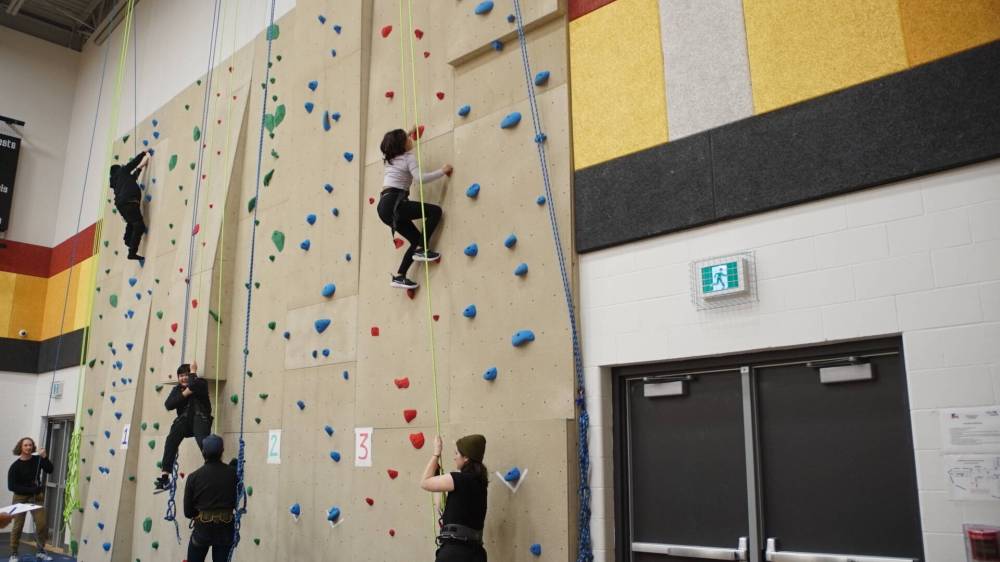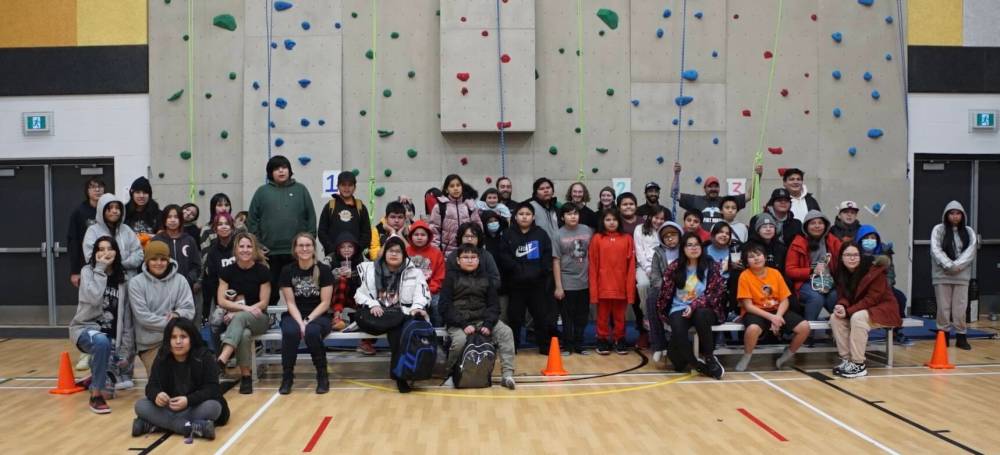Good health within reach
First Nations students exercise, learn together
Advertisement
Read this article for free:
or
Already have an account? Log in here »
To continue reading, please subscribe:
Monthly Digital Subscription
$0 for the first 4 weeks*
- Enjoy unlimited reading on winnipegfreepress.com
- Read the E-Edition, our digital replica newspaper
- Access News Break, our award-winning app
- Play interactive puzzles
*No charge for 4 weeks then price increases to the regular rate of $19.00 plus GST every four weeks. Offer available to new and qualified returning subscribers only. Cancel any time.
Monthly Digital Subscription
$4.75/week*
- Enjoy unlimited reading on winnipegfreepress.com
- Read the E-Edition, our digital replica newspaper
- Access News Break, our award-winning app
- Play interactive puzzles
*Billed as $19 plus GST every four weeks. Cancel any time.
To continue reading, please subscribe:
Add Free Press access to your Brandon Sun subscription for only an additional
$1 for the first 4 weeks*
*Your next subscription payment will increase by $1.00 and you will be charged $16.99 plus GST for four weeks. After four weeks, your payment will increase to $23.99 plus GST every four weeks.
Read unlimited articles for free today:
or
Already have an account? Log in here »
Hey there, time traveller!
This article was published 26/01/2024 (667 days ago), so information in it may no longer be current.
The Manitoba First Nations School System is celebrating the end of a historic week after hosting its inaugural diabetes camp and an indoor rock-climbing championship, both of which promoted the importance of regular exercise among youth.
About 20 campers — each of whom has Type 1 or 2 diabetes, has a family member with a diagnosis, or is at-risk of developing the chronic disease — went to a winter retreat in Headingley where they learned to snowshoe and read nutritional labels.
Also this week, more than 100 visitors arrived in Bloodvein First Nation to compete in the Indigenous-run school board’s first annual climbing contest Thursday.

Miskooseepi School is home to “the ultimate jungle gym,” said Mike Thomas, a phys-ed and health program facilitator.
“When kids showed up, when they saw that wall, I saw a few kids’ eyes light up and a few jaws drop,” Thomas said, referring to the gymnasium’s climbing routes that are 24 feet tall — one of the unique features in a state-of-the-art school that opened in 2022.
Brokenhead, Roseau River, Black River and Tataskweyak (Split Lake) sent teams of children in grades 5, 6, 7 and 8 for the inter-school event — a rarity given the students live in First Nations that are hours apart.
For many participants, the contest marked their first climbing experience. (Miskooseepi staff re-arranged rock holds and paths before the timed competition to limit their students’ advantage; final calculations are ongoing so the winner has yet to be announced.)
Attendees described the atmosphere as “electric” and “buzzing with excitement.” Despite competing against one another to complete each path and do so as quickly as possible, the middle schoolers cheered one another on throughout the day-long event.
“When you’re rock-climbing, it’s kind of you against the wall so (students) were watching people go up against the opponent they just faced or were about to face,” said Sidney Klassen, a phys-ed teacher who enlisted friends from the Wild Loon Adventure Co. to help with harnesses and belaying so children could safely scale the gymnasium wall.
Klassen said competitors were challenged physically to use their grip, forearm and overall strength, but their brains also got a workout from all the strategizing and planning required to ascend to the top.
“There’s a sense of pride in hosting something like this, and it was great seeing how much of a spectator sport climbing actually is,” he said, noting students, staff and community members packed the bleachers to watch the first-of-its-kind contest.
Executive director Charles Cochrane said one of the key priorities of the Manitoba First Nations Education Resource Centre, which operates MFNSS, is bringing Anishinaabe communities together to network and build friendships.
Cochrane said the promotion of physical activity and mental wellness was also behind both the climbing contest and Abinoonjii Mino Ayaawin Winter Camp (Children’s Wellness Camp).
MFNSS designed the camp, held at Camp Manitou from Monday through Thursday, to equip young diabetics with culturally sensitive tips for healthy living and foster a sense of belonging among them.
Indigenous children are about 20 times more likely to have Type 2 diabetes — a diagnosis that is heavily stigmatized — than their peers in Manitoba and there is little evidence to suggest genetic predisposition is at play.

Dr. Allison Dart, who studies chronic diseases and at-risk populations, noted that racism in the health-care system, poverty, food insecurity, and an absence of “safe places to play” are all contributing factors.
“It’s not individual choices that have increased the risk. It’s the impact of colonial policies that have led to living conditions that make accessing healthy living impossible,” said the pediatric nephrologist and clinical researcher at the Children’s Hospital Research Institute of Manitoba.
Dart said it’s important children understand that their diagnosis is not their fault and have opportunities to interact with others who have the same health condition for peer mentorship purposes.
The organizers of MFNSS’ new camp combined the western medical approach to caring for diabetes with traditional land-based wellness practices, said Gabrielle Peterson, clinical services team lead for the division.
Students aged 10 to 17 went skating, cross-country skiing and participated in sharing circles with elders and knowledge keepers. The itinerary included disease prevention and management sessions.
“They learned about all of the different ways you can be active – you don’t need a fancy gym or fancy equipment. You can do very easy things like going outside, going for walks and even just being able to find a YouTube video and follow along,” Peterson said.
She added she hopes the campers educate others upon their return to Pukatawagan, St. Theresa Point, Gods Lake Narrows, Dakota Plains, Sagkeeng, Roseau River, and Jackhead.
maggie.macintosh@freepress.mb.ca

Maggie Macintosh
Education reporter
Maggie Macintosh reports on education for the Free Press. Originally from Hamilton, Ont., she first reported for the Free Press in 2017. Read more about Maggie.
Funding for the Free Press education reporter comes from the Government of Canada through the Local Journalism Initiative.
Every piece of reporting Maggie produces is reviewed by an editing team before it is posted online or published in print — part of the Free Press‘s tradition, since 1872, of producing reliable independent journalism. Read more about Free Press’s history and mandate, and learn how our newsroom operates.
Our newsroom depends on a growing audience of readers to power our journalism. If you are not a paid reader, please consider becoming a subscriber.
Our newsroom depends on its audience of readers to power our journalism. Thank you for your support.


